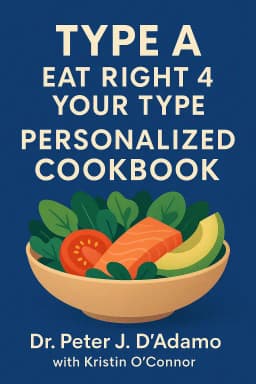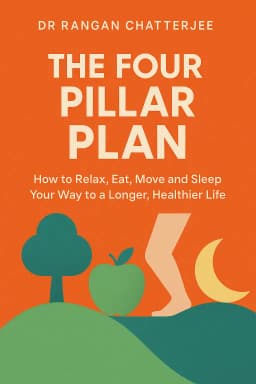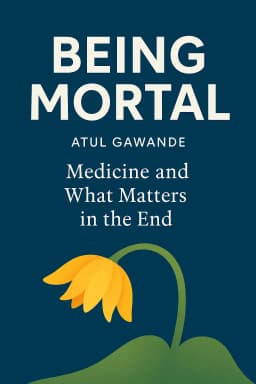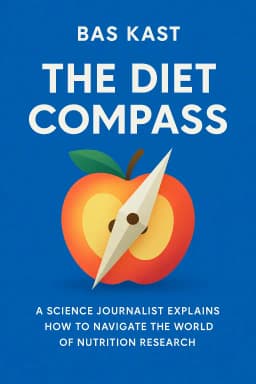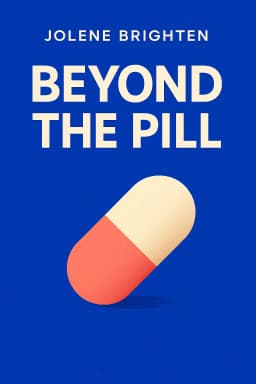
The Pill's Hidden Price Tag
Golden Hook & Introduction
SECTION
Laura: The birth control pill is often hailed as one of the greatest tools for female liberation. But what if, for millions of women, the very thing meant to give them control is silently stealing it away, one hormone at a time? Sophia: Whoa, that’s a heavy opener. You’re talking about one of the most prescribed medications on the planet. The idea that it's secretly a villain feels… dramatic. But I'm intrigued. Laura: It is dramatic, and that's exactly the conversation at the heart of the book we're diving into today: Beyond the Pill by Dr. Jolene Brighten. And Dr. Brighten isn't just any author; she's a board-certified naturopathic endocrinologist. She’s built her career on investigating the root causes of hormonal issues, which is a very different approach from just managing symptoms with a prescription pad. Sophia: Okay, so she’s coming at this from a different angle than a typical GYN. That context is important. So, what exactly is this ‘price tag’ of the pill that she’s talking about? What’s being stolen? Laura: In a word? Your self. Your energy, your mood, your libido. Dr. Brighten argues that for many women, the pill creates a cascade of symptoms that the medical community often dismisses or, worse, tries to treat with more medication. She gives this collection of symptoms a name. Sophia: Which is? Laura: Post-Birth Control Syndrome.
The Pill's Hidden Price Tag: Unmasking Post-Birth Control Syndrome
SECTION
Sophia: Hold on. 'Post-Birth Control Syndrome.' Is that an officially recognized medical diagnosis? I feel like if I said that to my doctor, they might just stare at me blankly. It sounds a bit… made up. Laura: That’s the exact controversy the book wades into. And you're right, you won't find PBCS in the DSM-5 or a standard medical textbook. It's a term Dr. Brighten and others in the functional medicine world use to give a name to a very real cluster of symptoms that appear after a woman stops taking hormonal birth control. We're talking about things like acne, irregular or missing periods, hair loss, anxiety, and gut problems. Sophia: So it’s a label for a pattern that women are experiencing, even if the establishment hasn't officially rubber-stamped it yet. Laura: Exactly. The book is full of stories, but one really stands out. It’s about a woman named Sarah, a vibrant 22-year-old college student. She’s outgoing, full of life, and in a happy relationship. She does what millions of young women do: she goes on the pill for contraception. It seems like the responsible, easy choice. Sophia: A totally normal story so far. Laura: Right. But then, over the next few months, a subtle shift begins. She starts feeling… flat. The activities she used to love don't excite her anymore. She becomes more withdrawn, struggling with this persistent sadness she can't shake. She chalks it up to the stress of college. Sophia: I can definitely relate to that. It’s so easy to blame stress for everything. Laura: She goes to her doctor, who is well-meaning, and suggests therapy or maybe even antidepressants. The doctor never once asks, "When did you start the pill?" The connection is never made. Sophia: Wow. So the potential chemical cause is completely overlooked. What happens to Sarah? Laura: After a full year of feeling like a ghost of her former self, she makes a decision on her own. She just stops taking the pill. And within a few weeks, the fog starts to lift. Her energy comes back. Her zest for life returns. She feels like herself again. It was the pill all along. Sophia: That is chilling. Because her story could be anyone's story. And it highlights this huge blind spot. Is there any hard science to back this up, beyond anecdotes? Laura: There is. The book points to studies, like one from the journal Hormones and Behavior, which found that women on oral contraceptives were significantly more likely to report symptoms of depression and anxiety. It's not just a feeling; it's a measurable biochemical change. The synthetic hormones in the pill can suppress our own natural hormone production, including testosterone, which is crucial not just for libido, but also for mood and a sense of vitality. Sophia: It’s like you’re turning down the volume on your own personality. And then there's the libido issue. The irony is just staggering. You take the pill so you can have a worry-free sex life, but it might just make you not want to have a sex life at all. Laura: That’s a huge point in the book. Maria's story is another powerful example. A happily married 30-year-old woman, starts the pill, and within months her libido vanishes. It causes real strain in her marriage. Her doctor’s solution? "Let's try a different brand of pill." Sophia: Which of course, doesn't work, because it's still synthetic hormones. Laura: Exactly. It wasn't until she switched to a non-hormonal IUD that her desire came back. These stories are powerful because they validate the experiences of so many women who have been told, "It's all in your head," or "That's not a known side effect." Dr. Brighten argues that it is a known side effect, it's just one we've been conditioned to ignore.
The Body's Blueprint for Recovery: Beyond the Pill and Back to You
SECTION
Sophia: Okay, so if the pill can cause this… hormonal chaos, it feels a bit hopeless. It’s a tool so many of us rely on. Are we just supposed to accept this as the price? What does Dr. Brighten say we can actually do about it? Laura: This is where the book shifts from problem to empowerment. The core message is that your body has an incredible capacity to heal. It wants to be in balance. You just have to remove the obstacles and give it the right building blocks. The book lays out a 30-day program, but the principles behind it are what's really fascinating. It all starts with understanding a few key systems the pill disrupts. Sophia: Where do we start? Laura: With the gut. Dr. Brighten calls the gut the "second brain," and for good reason. It’s a major player in your hormonal health. For instance, she points out that about 20 percent of your inactive thyroid hormone, T4, is converted into the active form, T3, in your gut. Sophia: Wait, so my thyroid health depends on my digestion? I always thought of the thyroid as this separate thing in your neck. Laura: They are deeply connected. And hormonal birth control can disrupt the gut microbiome—the delicate ecosystem of bacteria living there. This can lead to inflammation and something called "leaky gut," where the gut lining becomes permeable. This not only messes with hormone conversion but also nutrient absorption. The pill can deplete your body of crucial nutrients like B vitamins, zinc, and magnesium, which are essential for making hormones and neurotransmitters like serotonin, your "happy chemical." Sophia: So the pill is like a double-whammy. It's putting in synthetic hormones that cause problems, and it's also robbing your body of the nutrients it needs to make its own natural, good-feeling hormones. Laura: You've got it. It creates a deficit. The book's approach is to first heal the gut and then replenish those lost nutrients. This isn't about a quick-fix "detox tea." It's about systematically supporting your body's own detoxification pathways, primarily the liver. Sophia: The liver. I feel like we hear that word a lot in wellness, but I don't really know what it does besides process last night's glass of wine. Laura: The liver is your body's master filtration system. It has to process everything, including the synthetic estrogen from the pill. When it's overworked, it can't do its job properly, and those excess hormones can get recirculated, leading to issues like estrogen dominance—think heavy periods, PMS, and mood swings. The book provides recipes and food lists full of things like broccoli sprouts and leafy greens that specifically support both phases of liver detox. Sophia: That makes sense. You have to clear out the old stuff before you can build the new. The whole process sounds… intensive. It sounds like it could take a long time. Laura: It does. And Dr. Brighten uses a brilliant analogy for this. She says trying to restore your health is like trying to turn the Titanic. You can't just yank the wheel hard to the left, or you'll capsize. You have to make a slow, steady, deliberate turn. Pharmaceuticals often work by yanking the wheel—forcing a change. Natural therapies work by gently, consistently guiding the ship back on course. It takes patience. Sophia: I love that analogy. It’s much more forgiving. It’s not about being perfect overnight; it’s about the direction you’re heading. Laura: And the most powerful tool for navigating that turn is something you already have: your menstrual cycle. Dr. Brighten argues passionately that a woman's period is her "fifth vital sign," just as important as blood pressure, heart rate, temperature, and respiratory rate. Sophia: The fifth vital sign. That reframes it completely. It’s not an inconvenience to be suppressed and eliminated; it’s a monthly report card on your overall health. Laura: A direct report card! What your period looks like—its color, its consistency, the symptoms that come with it—is all data. It's your body communicating with you. The goal of the "Beyond the Pill" protocol is to help you learn to read that report card and give your body what it needs to get a glowing review.
Synthesis & Takeaways
SECTION
Sophia: When you zoom out from all the science and the protocols, what do you think is the single biggest message of this book? Is it simply 'don't take the pill'? Laura: I think that’s the common misinterpretation. The book's message isn't anti-pill; it's profoundly pro-information. It’s about shifting the power dynamic in women's healthcare. For decades, the conversation around birth control has been framed almost exclusively by its convenience and effectiveness. Dr. Brighten is arguing that the conversation needs to be about true informed consent. Sophia: Which means understanding the full spectrum of effects, not just the ones that fit on the pamphlet in the doctor's office. Laura: Exactly. It’s about recognizing that your hormones are the operating system for your entire body, not just your reproductive organs. They influence your brain, your bones, your mood, your metabolism. And the idea that we can introduce powerful synthetic versions into that system without expecting widespread consequences is, she argues, fundamentally flawed. The ultimate takeaway is that your period isn't a disease to be cured or an inconvenience to be switched off. It's a vital sign. Ignoring its signals is like putting a piece of tape over the check engine light in your car. Sophia: The problem is still there, you’re just choosing not to see it. That is such a powerful reframe. So for someone listening who feels a little overwhelmed but also inspired, what’s one concrete, manageable first step they could take from the book? Laura: It’s surprisingly simple. Dr. Brighten suggests just starting to track your cycle. Even if you're on the pill and don't have a "real" cycle, track your withdrawal bleed. Pay attention to your energy levels, your mood, your digestion, your skin throughout the month. Don't try to fix anything yet. Just start gathering your own data. Become the lead researcher of your own body. Sophia: I love that. It’s not about throwing your pills away tomorrow. It’s about opening your eyes and paying attention. That feels so empowering. We'd love to hear from our listeners on this. Have you ever suspected a medication was affecting you in ways your doctor might have dismissed? Share your story with the Aibrary community on our socials. It's a conversation that needs to happen more openly. Laura: It absolutely does. Knowledge is the first step to taking back control. Laura: This is Aibrary, signing off.
